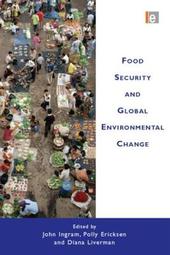
|
Food Security and Global Environmental Change
Paperback
Main Details
| Title |
Food Security and Global Environmental Change
|
| Authors and Contributors |
Edited by John Ingram
|
|
Edited by Polly Ericksen
|
|
Edited by Diana Liverman
|
| Physical Properties |
| Format:Paperback | | Pages:384 | | Dimensions(mm): Height 231,Width 155 |
|
| Category/Genre | Global warming
Sustainability |
|---|
| ISBN/Barcode |
9781849711289
|
| Classifications | Dewey:363.8 |
|---|
| Audience | | Postgraduate, Research & Scholarly | |
|---|
| Illustrations |
Diagrams, tables, graphs, index
|
|
Publishing Details |
| Publisher |
Taylor & Francis Ltd
|
| Imprint |
Earthscan Ltd
|
| Publication Date |
14 October 2010 |
| Publication Country |
United Kingdom
|
Description
Global environmental change (GEC) represents an immediate and unprecedented threat to the food security of hundreds of millions of people, especially those who depend on small-scale agriculture for their livelihoods. As this book shows, at the same time, agriculture and related activities also contribute to GEC by, for example, intensifying greenhouse gas emissions and altering the land surface. Responses aimed at adapting to GEC may have negative consequences for food security, just as measures taken to increase food security may exacerbate GEC. The authors show that this complex and dynamic relationship between GEC and food security is also influenced by additional factors; food systems are heavily influenced by socioeconomic conditions, which in turn are affected by multiple processes such as macro-level economic policies, political conflicts and other important drivers. The book provides a major, accessible synthesis of the current state of knowledge and thinking on the relationships between GEC and food security. Most other books addressing the subject concentrate on the links between climate change and agricultural production, and do not extend to an analysis of the wider food system which underpins food security; this book addresses the broader issues, based on a novel food system concept and stressing the need for actions at a regional, rather than just an international or local, level. It reviews new thinking which has emerged over the last decade, analyses research methods for stakeholder engagement and for undertaking studies at the regional level, and looks forward by reviewing a number of emerging 'hot topics' in the food security-GEC debate which help set new agendas for the research community at large. Published with Earth System Science Partnership, GECAFS and SCOPE
Author Biography
John Ingram is Executive Officer at the Global Environmental Change and Food Systems (GECAFS) International Project Office, Environmental Change Institute (ECI), Oxford University Centre for the Environment, UK. Polly Ericksen was Science Officer at the Global Environmental Change and Food Systems (GECAFS) International Project Office, Environmental Change Institute (ECI), Oxford University Centre for the Environment, UK. She is now at the International Livestock Research Institute (ILRI), Nairobi, Kenya. Diana Liverman is Chair of the GECAFS Scientific Advisory Committee, co-director of the Institute of the Environment at the University of Arizona and a Visiting Professor in Environmental Policy and Development in the School of Geography and the Environment at the University of Oxford.
Reviews'The enormity of the food security challenge is now widely accepted but there is less agreement on analyses, solutions, emphases and policy directionsi? The urgency of the task is why this weighty collection is so welcome and so important. It is a major contribution to our global policy thinking.' Tim Lang, City University, UK 'The enormity of the food security challenge is now widely accepted but there is less agreement on analyses, solutions, emphases and policy directions. We need to fuse action on social, environmental and supply fronts, and to engender change on a scale and with a rapidity which only comes in crises. The urgency of the task is why this weighty collection is so welcome and so important. It is a major contribution to our global policy thinking.' Tim Lang, City University, UK 'This book helps us understand the complex linkages between food security and global environmental change. Drawing on detailed case studies from diverse regions, it shows the kind of actions needed to counter food insecurity and ensure investments pay off. Its focus on whole food systems, rather than on agriculture alone, gives it a special place in the literature.' Bruce Campbell, CGIAR Program 'Climate Change, Agriculture and Food Security', University of Copenhagen, Denmark 'This book provides an innovative, timely and relevant analysis of food security issues that encourages the reader to think outside the box in both analysis and action. It goes beyond the usual climate change and agriculture discussion and, by combining an inclusive and interdisciplinary approach, it conveys clear messages for policy making at various levels.' Cheikh Mbow, Universiti? Cheikh Anta Diop de Dakar-Si? ni? gal, Senegal 'Food security for many is already a critical issue and the situation is getting accentuated further in the context of increasing uncertainties not only from global environmental change but from other factors such as globalization. This volume, therefore, is very timely in bringing together many of the issues determining the links between food security and environment.' P. S. Ramakrishnan, Jawaharlal Nehru University, India 'In this impressive volume, John Ingram, Polly Ericksen, Diana Liverman and their colleagues address critical issues associated with transitioning to a more sustainable food future. Their analysis of the complex interactions between food security and dynamic drivers of global environmental change is both conceptually and methodologically sophisticated. They apply an innovative synthetic framework to a set of fascinating, empirically rich, regional case studies and draw important conclusions for both food and climate science policy and practice. Their book highlights the need to identify and pursue multiple pathways at a range of levels on different scales to achieve greater synergy between improved food security and sustainable environmental outcomes.' John Thompson, Institute of Development Studies, UK
|